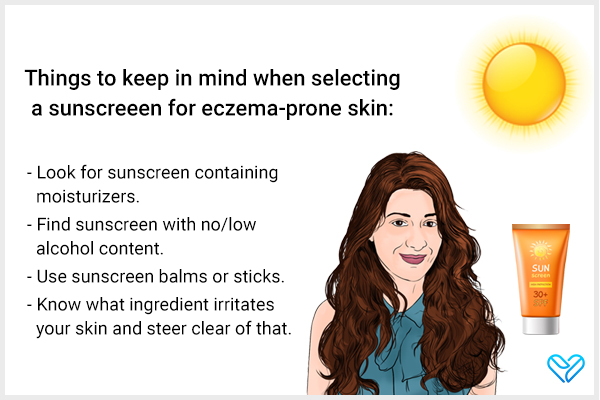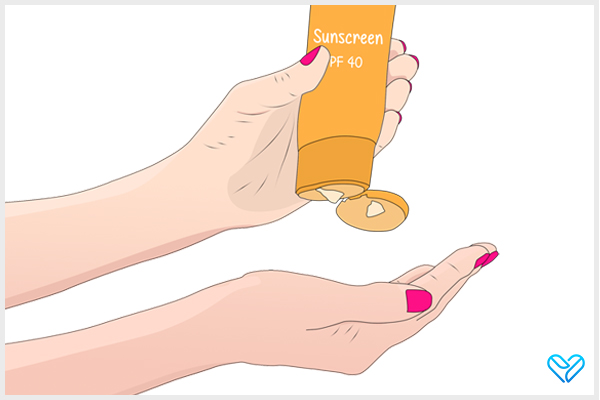In this article:
Yes, sunscreen can potentially irritate eczema-affected skin in some individuals.

Eczema is a skin condition that causes dry and inflamed skin. Some people with eczema may experience a specific type of reaction called contact dermatitis with sunscreen application.
Contact dermatitis occurs when sensitive individuals come into contact with certain ingredients such as fragrances or chemical filters found in sunscreen. (1)(2)
So, it is crucial for those with eczema to be aware of their skin’s sensitivity and to select sunscreens that are hypoallergenic and specially formulated for sensitive skin types.
This article will further explore how and whether sunscreen can exacerbate eczema.
Ingredients in Sunscreen That Can Cause or Worsen Eczema
Certain ingredients in sunscreen can potentially irritate the skin and exacerbate eczema. (3)(4)
1. Chemical filters may cause allergic reactions in eczema
According to experts, chemical filters such as oxybenzone, avobenzone, and benzophenone-4 are known to sometimes cause delayed allergic reactions. These chemicals are used in sunscreens to absorb the sun’s rays. (3)(4)
2. Octocrylene may trigger photoallergic reactions in eczema
There is a rare allergic reaction called photoallergic contact dermatitis that people with eczema should be aware of. This occurs when certain ingredients in sunscreen remain inert on the skin until they are activated by UV rays, causing a flare-up.
One ingredient, octocrylene, is associated with this reaction, especially in adults using lotions with the drug ketoprofen. Octocrylene has also been found to trigger a contact allergy in children. (3)(4)
3. High alcohol content may cause irritation in eczema
According to experts, the most common irritant reactions to sunscreen occur immediately and are characterized by stinging and burning. This is often caused by the high alcohol content in sunscreen. (4)
4. Inactive ingredients such as fragrances can cause allergy symptoms in eczema
Allergic reactions to sunscreen are rare and usually have a slower onset. The symptoms may appear within a few hours or days and are often characterized by itching.
The most common allergens are typically the inactive ingredients, such as fragrances and preservatives. (4)
Note: Dermatologists can perform patch testing and allergic contact dermatitis testing to help identify specific ingredients to avoid in the future.
Sunscreen Use When Suffering From Eczema
Individuals with eczema should still use sunscreen because their skin is more vulnerable to the harmful effects of sun exposure than normal skin. (5)
However, if you have eczema, it is important to be cautious when using sunscreen due to the potential for certain ingredients to cause inflammation and skin reactions.
Keep the following in mind when selecting a sunscreen when suffering from eczema.

1. Look for a sunscreen containing moisturizers
If you have atopic dermatitis (AD) or eczema, you have a compromised skin barrier, making you susceptible to the penetration of allergens from sunscreen, leading to allergic contact dermatitis.
To address this, you can apply sunscreen-containing moisturizers as they not only offer sun protection but also improve moisturization and support barrier repair. (5)
2. Find a sunscreen with no/low alcohol content
It’s best to find a sunscreen without any alcohol at all, although finding a sunscreen without alcohol or with a minimal amount can be challenging because alcohol content is not well regulated and not clearly indicated in the ingredients list.
But do your best to look for an alcohol-free sunscreen. (4)
3. Use sunscreen balms or sticks
Experts recommend using thicker sunscreen balms or sticks and looking for sunscreens labeled “for sensitive skin” if you suffer from eczema. (4)
4. Identify and steer clear of ingredients that irritate your skin
As mentioned above, active ingredients such as oxybenzone and inactive ingredients such as fragrances can cause skin reactions.
It is highly recommended to consult a dermatologist who can help you understand what ingredient can irritate your skin, so you can buy sunscreens that do not contain that particular ingredient.
5. Other specifications to look for in a sunscreen
While purchasing sunscreen, these are the checkboxes you have to tick. (4)(5)
- Sunscreen should be broad-spectrum with an SPF of 30 or higher.
- If you’re allergic to chemical sun filters such as oxybenzone, buy sunscreen with inorganic filters such as zinc oxide.
Proper Sunscreen Application for People With Eczema
Here are the steps to apply sunscreen correctly:
- Choose a broad-spectrum sunscreen with SPF 30 or higher.
- Apply it 15 minutes before sun exposure to allow the product to be absorbed.
- Cover all exposed areas, including the face, ears, and neck.
- Reapply every 2 hours or more often if swimming or sweating.
- Use sunscreen on cloudy days too, as UV rays can still harm the skin during these days.
- Protect your lips with a lip balm with SPF.
- Wear protective clothing and seek shade under a roof or a tree during peak sun hours (10 am to 4 pm).
Most-Asked Questions
When is it recommended to use sunscreen?
To protect the uncovered skin when going outside, it is recommended to use sunscreen every day. (6)
What SPF level is recommended by dermatologists?

For optimal protection against the sun’s UVB rays, dermatologists suggest using a sunscreen with at least SPF 30, which blocks 97% of the rays. (7)
How often should sunscreen be reapplied?
Reapplying sunscreen every two hours when staying outdoors is recommended.
Can sunscreen be used on children?
Yes, sunscreen is safe for children, but it is recommended to use sunscreen formulated specifically for children and to reapply it frequently.
What are the common symptoms of sunscreen reactions in people with eczema?
Symptoms may include redness, itching, and burning.
What ingredients in sunscreen can trigger eczema reactions?
Ingredients such as fragrances, preservatives, and certain chemicals such as oxybenzone and avobenzone can potentially trigger or worsen eczema.
Should I avoid sunscreen altogether if I have eczema?
No, individuals with eczema should still use sunscreen.
How can I know if I’m allergic to a specific sunscreen ingredient?
Consulting a dermatologist or allergist can help identify specific ingredients you are allergic to.
Final Word
People with eczema frequently experience negative skin reactions to sunscreens. Due to the numerous potential allergens present in these products, individuals with eczema may be at higher risk of allergic reactions.
However, wearing the right type of sunscreen and not using sunscreens with irritating ingredients can be helpful and are a must for sun protection in those with eczema.
- Was this article helpful?
- YES, THANKS!NOT REALLY


